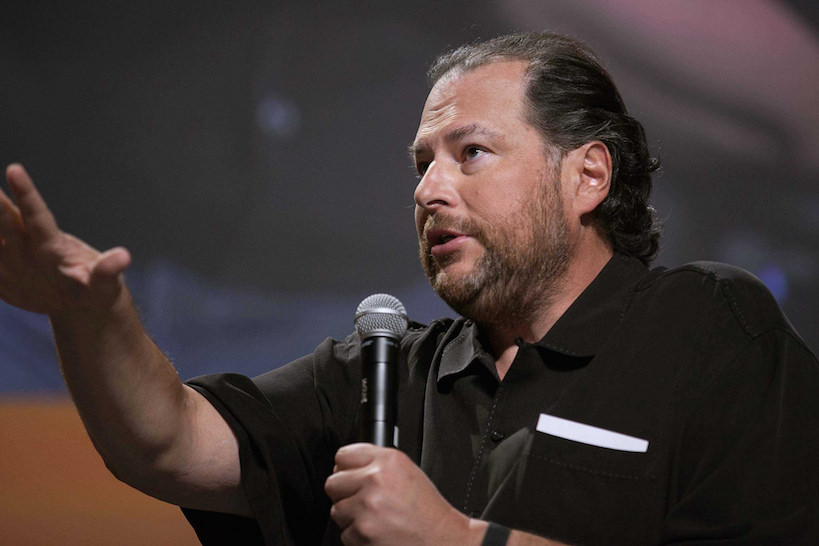 CLOUD
CLOUD
 CLOUD
CLOUD
 CLOUD
CLOUD
Updated:
Salesforce.com Inc. saw its stock fall almost 3 percent in after-hours trading today on weaker-than-expected guidance for its new quarter.
The disappointing forecast took the gloss off what was otherwise an excellent fiscal fourth-quarter performance that easily beat Wall Street’s expectations. The company, which sells customer relationship management software in the cloud, also posted record annual revenue for its 2019 fiscal year.
For the fourth quarter, Salesforce reported earnings before certain costs such as stock compensation of 70 cents per share on revenue of $3.6 billion, up 26 percent from a year ago. Wall Street analysts had forecast earnings of just 55 cents per share on revenue of $3.56 billion.
The bulk of Salesforce’s revenues came from subscriptions and support services, totaling $3.38 billion, up 26 percent from the same period one year ago. Professional services and other revenue came to $228 million, up 16 percent. For the year, Salesforce reported its full year a profit per share of $2.75 on revenue of $13.28 billion, up 26 percent from the previous year.
“We had another year of outstanding revenue growth, surpassing $13 billion in revenue faster than any other enterprise software company in history,” Salesforce’s co-Chief Executive Officer Marc Benioff (pictured) said in a statement. “As companies of all sizes turn to Salesforce, we’re enabling them to put the customer at the center of their digital transformation through our intelligent Customer 360 platform.”
Salesforce’s growth cannot be denied, but fickle investors are swayed not by past performance but instead by expectations, and in that regard the company left much to be desired. The 2.7 percent after-hours drop followed a 3.7 percent decline in the regular session on a poor day for tech stocks broadly. Update: Shares fell less than 1 percent in Tuesday trading on a flat day for the overall market.
Executives said the company is forecasting first-quarter profit of 60 to 61 cents per share on revenue of $3.67 billion to $3.68 billion. That was lower than anticipated, with Wall Street analysts predicting a profit of 63 cents on revenue of $3.7 billion.
The main issue for shareholders is that the company’s projected first-quarter revenue growth of 22 percent would be its smallest increase since 2010, JMP Securities analyst Pat Walravens told Bloomberg. “Investors like to see an acceleration,’’ he said.
Salesforce isn’t alone in reducing its guidance for the first quarter, and in fact its decision to do so reflects what seems to be a trend among technology companies to offer a more cautious outlook. Dozens of tech firms, including Box Inc., Dropbox Inc., Nvidia Corp. and even Amazon.com Inc., have all came up short with their guidance in recent weeks.
Charles King, an analyst with Pund-IT Inc., told SiliconANGLE this trend could be related to warnings from economists of “rough financial weather” this year, thanks to the continued trade impasse between the U.S. and China and other factors.
“I suspect that some businesses have decided that it’s better to be cautious and hope to exceed poor expectations than it is to run optimistically into a wall of potential disappointment,” King said. “Despite Salesforce’s guidance, the company seems to be in good shape. The larger an enterprise becomes, the harder it is to support early-phase torrid growth. That said, there are probably hundreds of businesses that would willingly kill to achieve Salesforce’s steady 20 percent-plus annual growth.”
The economic outlook isn’t helped by the general political uncertainty in the U.S. either, said analyst Rob Enderle of the Enderle Group.
“The U.S. administration has been tossing out a lot of uncertainty, and the ‘throw crap against the wall’ approach that the Democrats are taking on their path to impeachment is also doing a lot of avoidable damage to the market,” Enderle said. “Salesforce’s results don’t appear isolated and they are likely a direct result of companies cutting back spending for fear they’ll be caught unprepared in a market downturn.”
Perhaps in expectation of shareholder’s reaction to the lower guidance, Salesforce’s co-CEOs Benioff and Keith Block said the company was targeting a new annual revenue goal of between $26 billion to $28 billion by 2023. If it hits that target, it would mean Salesforce doubling its revenue within the next four years.
It’s an ambitious goal, and Salesforce said it will spend a lot of money to try to reach it. The company is planning to open new offices around the world, hire more workers and make more acquisitions. For example, it will hire about 1,500 new staff in Ireland alone over the next five years.
Still, it will be tough for Salesforce to hit those kinds of numbers because competition in its market will heat up in the years to come, another analyst warned.
“Salesforce had a very good year with all key growth numbers in the twenties, with only professional services in the teens,” said Holger Mueller, principal analyst and vice president of Constellation Research Inc. “But the lowered guidance of 2019 reflects the fact that it’s hard for Salesforce to maintain its growth rates, and that key competitors will not allow it to grow so easily anymore.”
But Mueller said there’s good news as well, since it’s branching out, partly with acquisitions such as MuleSoft Inc.
Salesforce has had a pretty quiet year on the product announcement front thus far, though it did add new artificial intelligence services to its Commerce Cloud automation platform for retail customers in January. The company also found the time to invest in a startup called ThousandEyes Inc. that helps companies to monitor their networking infrastructure for possible problems.
THANK YOU